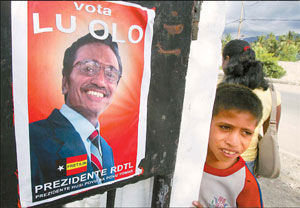| Home / International / International -- News | Tools: Save | Print | E-mail | Most Read |
| E. Timorese Vote Today for New President |
| Adjust font size: |
For tens of thousands of East Timorese who fled their homes last year when the tiny nation descended into chaos, the main hope from today's presidential election is that it will allow them to go home.
Outgoing President Xanana Gusmao has said But the shadow of violence remains. Supporters of rival candidates clashed during campaigning last week, injuring more than 30 people and prompting international troops to fire tear gas and warning shots. "I want to return home, but I'm still afraid," said Sofia Rofinus, a 38-year-old former teacher, who has lived in a tent with her five-year old daughter and husband for almost a year. At the camp in the capital, children were flying kites in the scorching sun, their hair unkempt and clothes shabby, while older people sat outside their tents to escape the heat inside. About 150,000 people were driven from their homes last year during violence that erupted after the government sacked 600 rebellious soldiers. Foreign troops were brought in to restore calm after dozens were killed. Eight candidates are running in the election, including interim Prime Minister Jose Ramos-Horta, a Nobel peace prize winner who spearheaded an overseas campaign for independence from President Gusmao, an ally of Ramos-Horta, is not running for re-election but plans to seek the more hands-on post of prime minister in separate parliamentary elections later this year. Gusmao has blamed election clashes on the Fretilin Party of ousted Prime Minister Mari Alkatiri, accusing its leaders of allowing supporters to provoke violence. Fretilin's candidate, Francisco Guterres, is another front-runner vying for support from just over half a million voters. Foreign troops, observers Julio Thomas of the National University of Timor Leste said a first round winner was unlikely given the number of candidates, voters and campaign turnouts. He sees the poll as a three-way race between Ramos-Horta, Guterres and Fernando de Araujo of the Democratic Party who has backing from many younger voters. Around 3,000 international troops and police will go on patrol to safeguard the elections, while about 200 international observers are monitoring the voting. East Timor's vote for independence from The United Nations ran the country until 2002. ( |
| Tools: Save | Print | E-mail | Most Read |
 |
| Related Stories |
 |
 |
|
 |
| Links |
